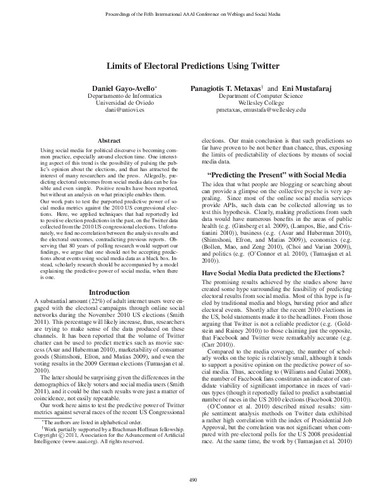Limits of Electoral Predictions using Twitter
Autor(es) y otros:
Fecha de publicación:
Editorial:
Association for the Advancement of Artificial Intelligence
Descripción física:
Resumen:
Using social media for political discourse is becoming common practice, especially around election time. One interesting aspect of this trend is the possibility of pulsing the public’s opinion about the elections, and that has attracted the interest of many researchers and the press. Allegedly, predicting electoral outcomes from social media data can be feasible and even simple. Positive results have been reported, but without an analysis on what principle enables them. Our work puts to test the purported predictive power of social media metrics against the 2010 US congressional elections. Here, we applied techniques that had reportedly led to positive election predictions in the past, on the Twitter data collected from the 2010 US congressional elections. Unfortunately, we find no correlation between the analysis results and the electoral outcomes, contradicting previous reports. Observing that 80 years of polling research would support our findings, we argue that one should not be accepting predictions about events using social media data as a black box. Instead, scholarly research should be accompanied by a model explaining the predictive power of social media, when there is one.
Using social media for political discourse is becoming common practice, especially around election time. One interesting aspect of this trend is the possibility of pulsing the public’s opinion about the elections, and that has attracted the interest of many researchers and the press. Allegedly, predicting electoral outcomes from social media data can be feasible and even simple. Positive results have been reported, but without an analysis on what principle enables them. Our work puts to test the purported predictive power of social media metrics against the 2010 US congressional elections. Here, we applied techniques that had reportedly led to positive election predictions in the past, on the Twitter data collected from the 2010 US congressional elections. Unfortunately, we find no correlation between the analysis results and the electoral outcomes, contradicting previous reports. Observing that 80 years of polling research would support our findings, we argue that one should not be accepting predictions about events using social media data as a black box. Instead, scholarly research should be accompanied by a model explaining the predictive power of social media, when there is one.
Descripción:
Fifth International AAAI Conference on Weblogs and Social, 17-21 July 2011, Barcelona, Spain
ISBN:
Colecciones
- Informática [875]
- Ponencias, Discursos y Conferencias [4233]
Ficheros en el ítem




